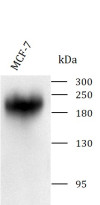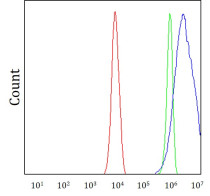ARG43899
anti-CD66e / CEA antibody
anti-CD66e / CEA antibody for ELISA,Flow cytometry,Western blot and Human
Overview
| Product Description | Rabbit Polyclonal antibody recognizes CD66e / CEA |
|---|---|
| Tested Reactivity | Hu |
| Tested Application | ELISA, FACS, WB |
| Host | Rabbit |
| Clonality | Polyclonal |
| Isotype | IgG |
| Target Name | CD66e / CEA |
| Antigen Species | Human |
| Immunogen | Human CD66e / CEA recombinant protein |
| Expression System | E.coli |
| Conjugation | Un-conjugated |
| Protein Full Name | Carcinoembryonic antigen-related cell adhesion molecule 5 |
| Alternate Names | CEACAM5; CEA Cell Adhesion Molecule 5; Carcinoembryonic Antigen-Related Cell Adhesion Molecule 5; CD66e; CEA; Carcinoembryonic Antigen Related Cell Adhesion Molecule 5; Meconium Antigen 100; Carcinoembryonic Antigen; CD66e Antigen |
Application Instructions
| Application Suggestion |
|
||||||||
|---|---|---|---|---|---|---|---|---|---|
| Application Note | * The dilutions indicate recommended starting dilutions and the optimal dilutions or concentrations should be determined by the scientist. |
Properties
| Form | Liquid |
|---|---|
| Purification | Affinity purified with Immunogen. |
| Buffer | 0.9% NaCl, 0.2% Na2HPO4 and 4% Trehalose. |
| Stabilizer | 4% Trehalose |
| Concentration | 0.5 mg/ml |
| Storage Instruction | For continuous use, store undiluted antibody at 2-8°C for up to a week. For long-term storage, aliquot and store at -20°C or below. Storage in frost free freezers is not recommended. Avoid repeated freeze/thaw cycles. Suggest spin the vial prior to opening. The antibody solution should be gently mixed before use. |
| Note | For laboratory research only, not for drug, diagnostic or other use. |
Bioinformation
| Database Links |
Swiss-port # P06731 Human Carcinoembryonic antigen-related cell adhesion molecule 5 |
|---|---|
| Gene Symbol | CEACAM5 |
| Gene Full Name | CEA Cell Adhesion Molecule 5 |
| Background | This gene encodes a cell surface glycoprotein that represents the founding member of the carcinoembryonic antigen (CEA) family of proteins. The encoded protein is used as a clinical biomarker for gastrointestinal cancers and may promote tumor development through its role as a cell adhesion molecule. Additionally, the encoded protein may regulate differentiation, apoptosis, and cell polarity. This gene is present in a CEA family gene cluster on chromosome 19. Alternative splicing results in multiple transcript variants. |
| Function | Cell surface glycoprotein that plays a role in cell adhesion, intracellular signaling and tumor progression. |
| Cellular Localization | Membrane |
| Calculated MW | 77 kDa |
| PTM | Disulfide bond, Glycoprotein, GPI-anchor, Lipoprotein |
Images (2) Click the Picture to Zoom In







